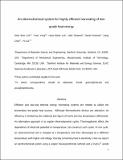An electrochemical system for efficiently harvesting low-grade heat energy
Author(s)
Lee, Seok Woo; Yang, Yuan; Lee, Hyun-Wook; Ghasemi, Hadi; Kraemer, Daniel; Chen, Gang; Cui, Yi; ... Show more Show less
DownloadAn electrochemical system for highly efficient harvesting of low-grade heat energy.pdf (2.003Mb)
PUBLISHER_POLICY
Publisher Policy
Article is made available in accordance with the publisher's policy and may be subject to US copyright law. Please refer to the publisher's site for terms of use.
Terms of use
Metadata
Show full item recordAbstract
Efficient and low-cost thermal energy-harvesting systems are needed to utilize the tremendous low-grade heat sources. Although thermoelectric devices are attractive, its efficiency is limited by the relatively low figure-of-merit and low-temperature differential. An alternative approach is to explore thermodynamic cycles. Thermogalvanic effect, the dependence of electrode potential on temperature, can construct such cycles. In one cycle, an electrochemical cell is charged at a temperature and then discharged at a different temperature with higher cell voltage, thereby converting heat to electricity. Here we report an electrochemical system using a copper hexacyanoferrate cathode and a Cu/Cu[superscript 2+] anode to convert heat into electricity. The electrode materials have low polarization, high charge capacity, moderate temperature coefficients and low specific heat. These features lead to a high heat-to-electricity energy conversion efficiency of 5.7% when cycled between 10 and 60 °C, opening a promising way to utilize low-grade heat.
Date issued
2014-05Department
Massachusetts Institute of Technology. Department of Mechanical EngineeringJournal
Nature Communications
Publisher
Nature Publishing Group
Citation
Lee, Seok Woo, Yuan Yang, Hyun-Wook Lee, Hadi Ghasemi, Daniel Kraemer, Gang Chen, and Yi Cui. “An Electrochemical System for Efficiently Harvesting Low-Grade Heat Energy.” Nature Communications 5 (May 21, 2014).
Version: Author's final manuscript
ISSN
2041-1723